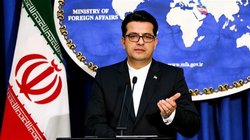 Iran's Foreign Ministry spokesman says US President Donald Trump’s initiative for resolution of the Palestinian-Israeli conflict seeks to fully compromise the Palestinian cause.
Iran's Foreign Ministry spokesman says US President Donald Trump’s initiative for resolution of the Palestinian-Israeli conflict seeks to fully compromise the Palestinian cause. RNA - Abbas Mousavi called the scheme “one of the most disgraceful of proposals and initiatives,” saying the US has devised the plan on the basis of ignorance of the Palestinian nation’s rights.
“From the Iranian people’s perspective, the ‘deal of century’ amounts to an imposed peace and the selling of Palestine,” he added.
“This plan is consigning the Palestinian cause to oblivion,” Mousavi said, adding that the Islamic Republic’s government will stand by the Palestinian government and people until the liberation of the holy occupied city of Jerusalem al-Quds.
Trump had announced the scheme, which he has controversially named the “deal of the century,” years ago but withheld its details.
On Tuesday, he unveiled the scheme’s outlines, which features the recognition of al-Quds as Israel’s “capital” -- although Palestinians want the city’s eastern part as the capital of their future state.
Trump also said under the plan, Israel would be annexing the settlements that it has been building in the West Bank since occupying the Palestinian territory in 1967.
This is while all previous foreign-mediated agreements between the Palestinians and Israelis as well as repeated United Nations resolutions have mandated Tel Aviv to withdraw behind the 1967 borders.
Palestinians, who had already spurned the plot, repeated their opposition to it soon after Trump’s announcement.
Mousavi said the only way out of the 70-year-old impasse brought about by Israel’s declaration of existence in 1948 is to seek recourse to popular vote concerning the fate of Palestine.
He also regretted some Muslim states’ alignment with Washington and Tel Aviv on the Palestinian issue.
“They do not discern their enemies from their friends,” the spokesman said. He hoped that recent developments help them rectify their views “and realize that their enemy is not but the entity called Israel.”
EU top diplomat’s Iran visit
The official also addressed a pending visit to Iran by the European Union’s foreign policy chief Josep Borrell.
The European official would be discussing the most recent developments concerning the 2015 Iran nuclear deal, Iran-EU relations, as well as the regional and international situation with President Hassan Rouhani, Foreign Minister Mohammad Javad Zarif, and Parliament Speaker Ali Larijani.
Mousavi said Iran considered the visit to be “important,” and that Tehran would be engaging Borrell in very “straightforward” talks.
He hoped that during the talks, Brussels would take heed of Tehran’s arguments, realize the roots of the current situation and the new logic governing it, and take serious action to deescalate existing tensions “if they [Europeans] entertain any good intentions.”
The visit is significant because it comes at a time when the European signatories to the nuclear deal — France, Britain and Germany — have failed to meet their commitments under the Joint Comprehensive Plan of Action (JCPOA).
Last month, the trio gave into Washington’s pressure and announced that they were triggering a dispute mechanism devised in the accord which amounts to a formal accusation that Tehran had broken the terms of the agreement.
Mousavi said, “The Americans have to abandon their naked animosity towards Iran.”
“This animosity is nothing new as it dates back to before the Islamic Revolution,” he added, referring to Washington’s enabling role in the 1953 coup that restored power to the US-backed monarchical regime in Iran.
The official noted that the antagonism manifested itself in the form of the US support for aggressors and terrorist activities against Iran and its oppressive sanctions following the Islamic Revolution.
Mousavi said while the Europeans were yet to trigger the dispute mechanism, they were convinced not to do so after receiving a 14-page legal letter addressed by Zarif to Borrell that brought the European states’ arguments into question.
Borrell, the spokesman added, will be told about Iran’s grievances toward Europe for siding with the US, and showing through its inaction that it does not possess either the will or the ability to withstand Washington’s pressure.
847/940